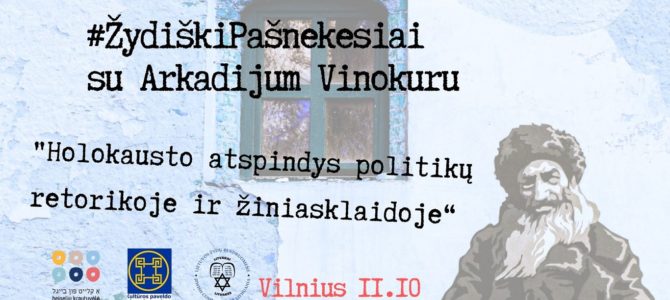The #ŽydiškiPašnekesiai web discussion started as part of the European Days of Jewish Culture this fall, whose motto this year was “Dialogue,” has turned into real-life meetings and discussions. Starting now every second Wednesday of the month will be devoted to discussions of Jewish history and heritage, subtle aspects of history and the issues which came up last fall with political, educational and public figures, held at 5:00 P.M. at the Bagel Shop Café at the Lithuanian Jewish Community, Pylimo street no. 4, Vilnius. There will also be relevant passages of music performed at these events.
The first such discussion is scheduled for November 10 under the title “Reflections of the Holocaust in Political Rhetoric and the Media.” The discussions will likely be held in Lithuanian. Founder of this new discussion club Arkadijus Vinokuras says: “Today only a small portion of Lithuanian society and especially politicians are able to speak at least respectfully about the tragedy which befell us all in the mid-20th century. Yes, all of us, all of Lithuanian society, without regard to ethnicity. It’s important to realize that ‘speaking respectfully’ about the Holocaust is one thing, and understanding the connections between the Holocaust and institutionalized anti-Semitism is another thing altogether. This kind of dualism arises often in speeches by politicians and is reflected in their actions. There are cases in the media (not just in Lithuania) where there is a lack of reflection and ‘innocent’ opinions are expressed, under the alleged right to ‘an alternative view of the holocaust.’ And no, writing the Holocaust uncapitalized is not an unintentional mistake here.”
Participants to include political scientist and MP Raimondas Lopata, philosopher and member of the executive board of the Human Rights Monitoring Institute Paulius Gritėnas, MP Paulė Kuzmickienė and Center for the Study of the Genocide and Resistance of Residents of Lithuania Arūnas Bubnys, moderated by Arkadijus Vinokuras. Vocalist Rafailas Karpis and pianist Darius Mažintas will present Yiddish and ghetto songs. The discussion will also be live-streamed on the internet.


